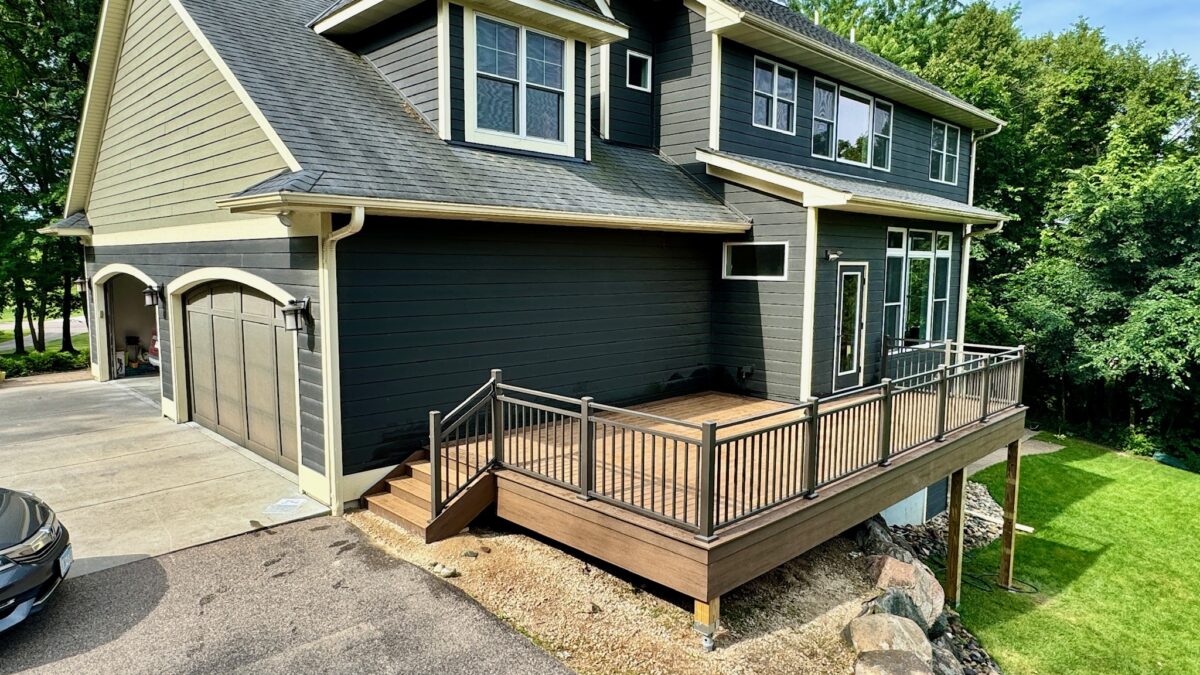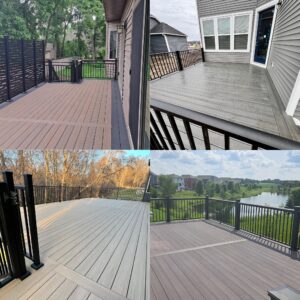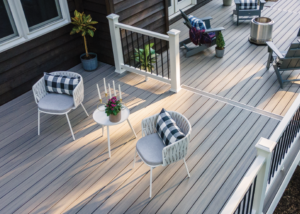
Decking is more than just an outdoor extension of your home. It’s a place where memories are made, from family barbecues to tranquil morning coffees.
The right decking is not only visually appealing but also durable and functional. But with so many options available, how do you decide?
In this article, we’ll compare different types of deck boards, from traditional wood to innovative composites. We’ll delve into brands like Azek, Trex Decking, Deckorators, and TimberTech, and discuss unique options like tongue and groove.
So, whether you’re a homeowner planning a DIY project or a professional deck builder, this guide will help you navigate the sea of decking options.

Trex vs TimberTech vs Deckorator
Understand Durability
Deck boards are the mainstay of any deck. They form the surface that we walk on, lounge on, and admire.
But they’re not just about aesthetics. The type of deck board you choose can significantly impact the durability and maintenance of your deck.
From resisting weather damage to providing a safe, non-slip surface, the right deck boards can make your outdoor space a joy to use. On the other hand, the wrong choice can lead to constant repairs and replacements.
So, understanding the different types of deck boards and their features is key to building a deck that’s both beautiful and long-lasting.
Materials Matter: Wood vs. Composite Deck Boards
When it comes to deck boards, the material you choose is crucial. It determines not only the look of your deck but also its longevity and maintenance needs.
Traditionally, wood has been the go-to material for deck boards. It’s natural, sturdy, and offers a classic charm that’s hard to resist. But wood deck boards require regular maintenance and can be prone to weather damage.
On the other hand, composite deck boards, made from a mix of wood fibers and plastic, is a smarter investment. They offer the look of wood without the high maintenance, and they’re resistant to many common decking issues.
Here’s a quick comparison:
- Wood Deck Boards: Natural, classic look, high maintenance
- Composite Deck Boards: Wood-like appearance, low maintenance, weather-resistant
Wood Deck Boards: Classic Charm But High Maintenance
Wood deck boards are the traditional choice for many homeowners. They offer a timeless appeal.
From the rich, warm tones of cedar and redwood to the durability of pressure-treated pine, wood deck boards come in a variety of types. Each has its unique characteristics and charm.
However, wood deck boards require regular maintenance. This includes staining, sealing, and checking for rot and insect damage.
Composite Deck Boards: The Modern Alternative
Composite deck boards are a modern alternative to traditional wood. They’re made from a mix of wood fibers and plastic, which gives them a wood-like appearance.
But unlike wood, composite deck boards are resistant to many common decking issues. They won’t rot, warp, or splinter, and they require minimal maintenance.
Plus, composite deck boards come in a variety of colors and textures. This means you can achieve the look of exotic hardwoods without the high cost or environmental impact.
Brand Breakdown: Comparing Top Manufacturers
When it comes to deck boards, several brands stand out. Each offers unique features and benefits, making the choice a matter of personal preference and specific needs.
From the innovation and style of Azek to the technology-driven durability of TimberTech, there’s a deck board brand for every project. Let’s take a closer look at some of the top manufacturers.
Azek Deck Boards: Innovation and Style
Azek is a brand known for its innovation and style. Their deck boards are crafted from capped polymer, offering superior resistance to moisture and rot.
Azek deck boards come in a variety of colors and textures. This allows homeowners to create a deck that truly reflects their style and complements their home.
Trex: The Pioneer of Composite Decking
Trex is a pioneer in the world of composite decking. Their deck boards are made from 95% recycled materials, making them a great choice for eco-conscious homeowners.
Trex deck boards are designed to resist fading, staining, scratching, and mold. Plus, they’re backed by a 25-year limited residential warranty, offering peace of mind.

Trex Decking
Deckorators: Aesthetic Engineering
Deckorators offers a range of innovative decking products. Their deck boards are known for their aesthetic beauty, with a wide range of colors and textures available.
From the rustic charm of their Heritage line to the sleek modern look of their Vista collection, Deckorators has something for every style. Plus, their deck boards are backed by an industry-leading warranty.

Deckorators Decking
TimberTech: Technology-Driven Durability
TimberTech is a brand that combines technology and durability. Their composite deck boards are designed to stand up to the elements, with resistance to moisture, UV rays, and staining.
TimberTech deck boards come in a variety of colors and finishes. This allows homeowners to create a deck that not only lasts but also looks great.
TimberTech also carries a line of porch tongue and groove deck boards for even more possibilities.
The Rise of Composite Decking
Composite decking has gained popularity in recent years. It’s a blend of wood fibers and plastics, offering the best of both worlds.
These boards are known for their durability and low maintenance. They resist rot, insects, and harsh weather conditions.
Despite being pricier upfront, their longevity and minimal upkeep make them a cost-effective choice in the long run.
Making the Right Choice for Your Climate and Lifestyle
Choosing the right deck boards depends on your local climate and lifestyle. If you live in a wet area, consider composite boards. They resist moisture and won’t warp or rot.
For those in sunny regions, opt for UV-resistant options. These boards won’t fade or crack under intense sunlight.
If you love entertaining outdoors, choose durable and scratch-resistant boards. They can withstand heavy foot traffic and furniture movement.
Remember, the right deck boards will enhance your outdoor living experience and add value to your home.
Maintenance and Longevity
Proper care can extend the life of your deck boards. Different materials require different maintenance routines.
For wood boards, regular sealing and staining are essential. This helps to prevent moisture damage and maintain the wood’s natural beauty.
Composite boards, on the other hand, require less upkeep. A simple cleaning routine is enough. Here’s a quick list:
- Sweep regularly to remove debris
- Wash with mild soap and water
- Avoid power washing to prevent surface damage
Remember, a well-maintained deck is a long-lasting deck.
Cost vs. Value
When it comes to deck boards, cost and value are two different things. Initial cost may not reflect the long-term value.
Wood boards are often cheaper upfront. However, they require regular maintenance which can add up over time.
Composite boards, while pricier initially, can save you money in the long run. Their durability and low maintenance needs offer great value. It’s all about weighing your options and deciding what’s best for you.
Final Thoughts
Choosing the right deck boards is a crucial decision. It impacts the look, longevity, and maintenance of your deck.
Consider your lifestyle, budget, and local climate. These factors will guide your choice between wood, composite, or a specific brand.
Remember, the best deck boards for you balance aesthetics, durability, and cost. It’s about finding what fits your needs and preferences.
In the end, a well-chosen deck can provide years of outdoor enjoyment. Make your choice count!
Shop colors and styles on our Decking Material page or download our Decking Brochure.
Find Out What
Your Project
Will Cost
Use our easy estimator tool to pick materials, explore options, and find out what your DIY deck project will cost!
Start Your Estimate

